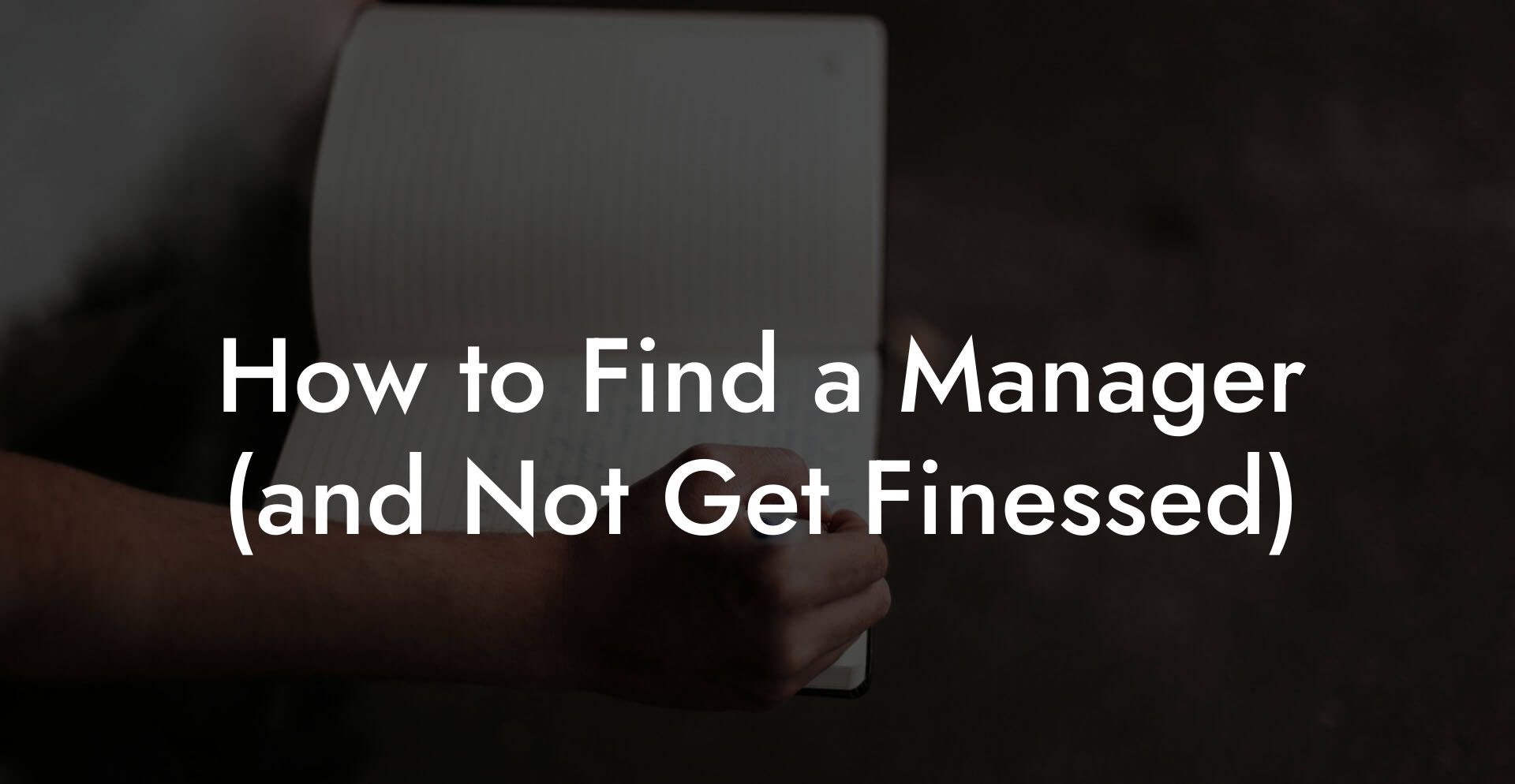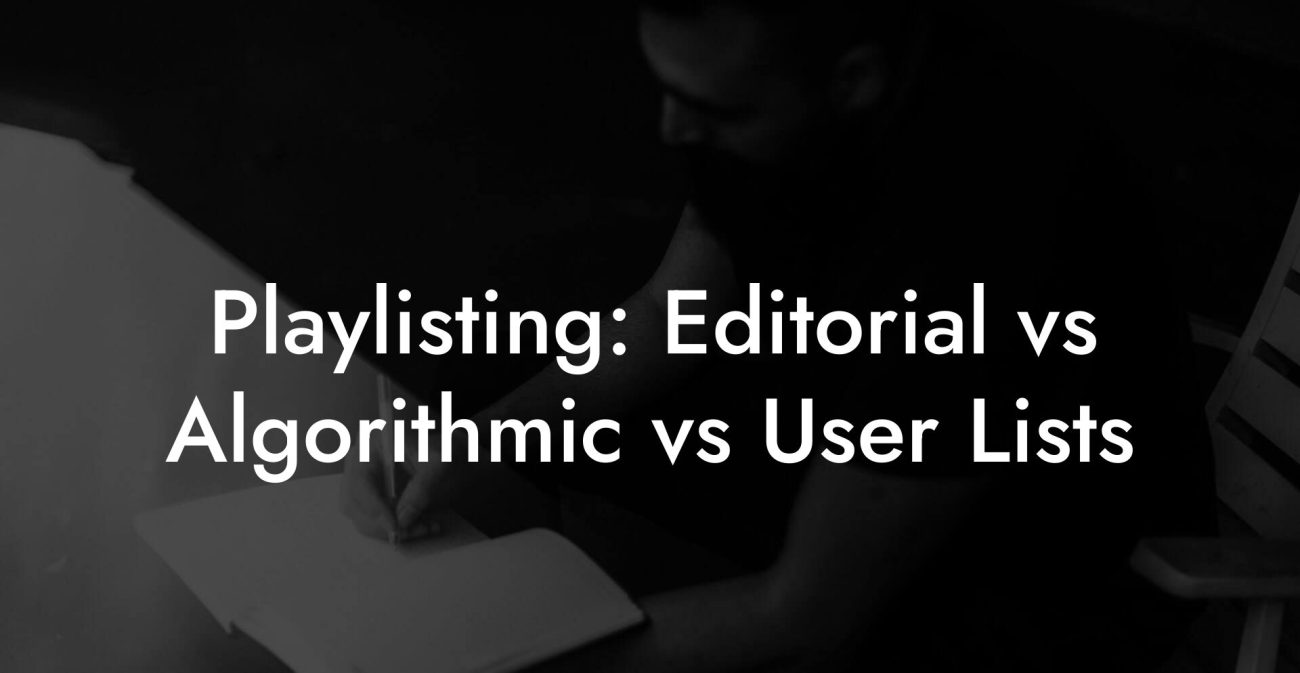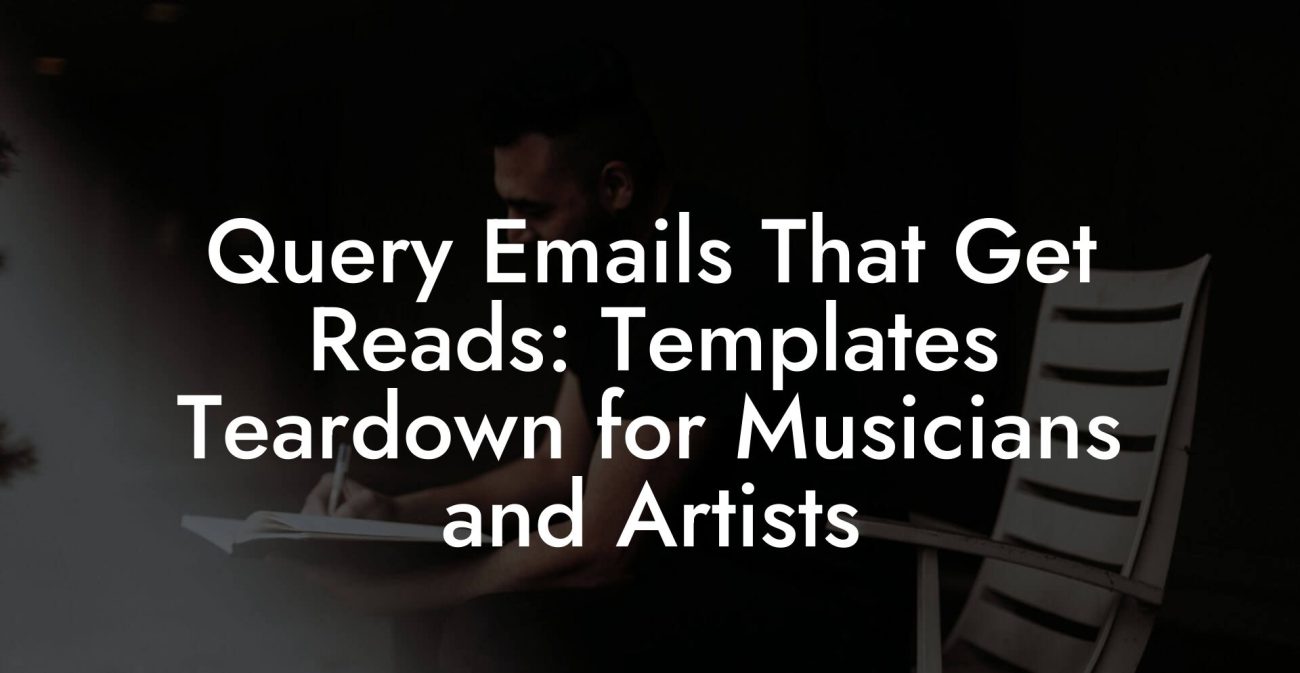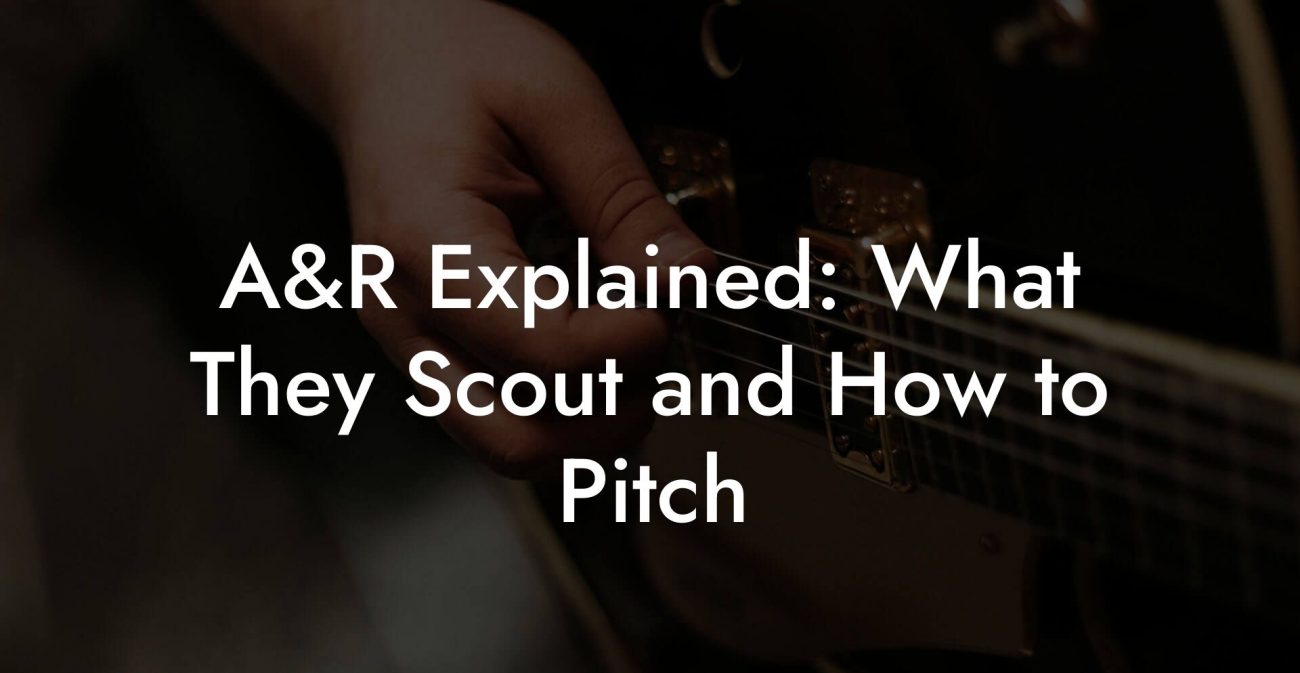Songwriting Advice
How to Find a Manager (and Not Get Finessed)

You wrote the song. You played the shows. You paid for the merch. Now you want someone who actually moves the needle without stealing your dreams and your royalties. A manager can be the difference between a basement cult and a career you can explain during family dinner without shame. But managers come in every flavor from ride or die hustlers to slick wolves who smell Spotify numbers and cash in quick. This guide teaches you how to find a manager who works, how to vet them, how to negotiate a fair deal, and how to avoid getting scammed. It is written in plain language with real world scenarios and a plan you can use today.
Quick Interruption: Ever wondered how huge artists end up fighting for their own songs? The answer is in the fine print. Learn the lines that protect you. Own your masters. Keep royalties. Keep playing shows without moving back in with Mom. Find out more →
Quick Links to Useful Sections
- Why you need a manager and when you do not
- What a manager actually does
- Manager vs booking agent vs lawyer vs label rep
- Manager
- Booking agent
- Lawyer
- Label representative or A and R
- Common management deal structures explained
- Commission based
- Flat fee or monthly retainer
- Hybrid models
- Advance or pay to manage
- Where to find managers
- Music industry meetups and conferences
- Referrals from other artists
- LinkedIn and social networks
- Music business directories and agencies
- Booking agents and industry pros
- How to prepare before you reach out
- How to approach a manager Email and D M templates
- Short email template
- Instagram DM template
- Interview questions to vet a manager
- Red flags and how to spot a finesse attempt
- They ask for upfront fees with no clear deliverables
- They promise guaranteed placements or label deals
- They refuse to provide references
- They ask for legal control over your accounts
- They offer deals that combine management with other services without disclosure
- Key contract terms to negotiate and why they matter
- Commission rate
- Term length
- Territory and exclusivity
- Sunset clause
- Accounting and payment terms
- Termination clauses
- How to check references and verify claims
- How to negotiate like someone who reads the fine print
- What to do when the relationship goes sour
- When to fire a manager
- Case studies and relatable scenarios
- Scenario 1: The friendly connector
- Scenario 2: The networked manager
- Scenario 3: The investor manager
- Practical checklist to find and sign a manager
- How to measure if your manager is working
- FAQ
- Action plan you can use this week
Terms matter. Acronyms matter. We will explain them. If you do not know what a manager should do, what a booking agent is, what a 360 deal means, or what a sunset clause is, this will get you fluent. We will also give email templates, interview questions, checklist items for contracts, and red flags to watch out for. Read this like your career depends on it. Because it does.
Why you need a manager and when you do not
A manager does many things that free you to create. The core job is to make strategic decisions, coordinate your team, open doors, and negotiate deals on your behalf. Managers focus on long term career building. They do not only book shows. They build relationships with labels, publishers, playlist curators, sync agents, promoters, and press. They help you pick which opportunities to say yes to. They also handle logistics, plan releases, and interpret data so you can act fast.
That said managers are not required at every stage. If you are producing all the work, consistently selling out DIY shows locally, and you are comfortable doing the business tasks, you can keep going alone. You might look for a manager when at least two of the following describe you:
- You are consistently selling out shows or scaling to bigger venues
- Your streaming numbers and social engagement are growing month over month
- Labels, publishers, or serious A and R reps are contacting you regularly
- You are getting offers that require negotiation beyond your experience
- You find your head is buried in admin and you have less time to write
If none of these are true then getting a manager too early can cost you money and control. A manager needs something to work with. They should be primarily paid on commission to align incentives. If someone asks you for a steep upfront fee to be your manager, pause.
What a manager actually does
Managers wear many hats depending on the artist and stage in the career. Here is a non exhaustive list of typical manager tasks.
- Career strategy and goal setting
- Team building including agents, lawyers, publicists, and producers
- Pitching to labels, publishers, and sync libraries
- Negotiating offers and reviewing contracts before legal review
- Coordinating release schedules and marketing moves
- Overseeing touring strategy and routing in collaboration with booking agents
- Daily problem solving and operations
- Revenue optimization and data analysis
In short a manager should be the person who sees the long game and clears the space for you to create while making sure the short term work moves toward that long game.
Manager vs booking agent vs lawyer vs label rep
These roles are not interchangeable. You want people who do their job. If someone markets themselves as agent manager lawyer everything at once, be careful.
Manager
Handles career strategy, team building, and day to day business. Gets paid a commission on income they help generate. Commission is usually between 15 and 20 percent. We will explain variations later.
Booking agent
Specializes in securing live shows and tours. Booking agents earn a commission on live income only. Agents usually take around 10 to 15 percent of gross live fees from the shows they book. Your manager will often work with a booking agent but not replace one.
Lawyer
Provides legal advice, negotiates contracts, and protects your rights. Lawyers charge by the hour or take a flat fee for a specific task. Lawyers do not take a percentage of your career earnings in normal scenarios. Always have a lawyer review any contract before you sign.
Label representative or A and R
Labels sign artists and often offer funding, distribution, marketing, and connections. A and R stands for Artists and Repertoire. An A and R rep scouts talent and shepherds artists into label deals. A label is not a manager. Labels want a piece of your revenue or rights in return for services. Managers help you determine if a label offer is worth it.
Common management deal structures explained
Managers get paid in different ways. Here are the structures you will encounter and what they mean. We explain terms and give real life scenarios so you can spot weird offers.
Commission based
The most common industry standard is commission based pay. This means the manager takes a percentage of your gross income that they help generate. The usual range is 15 to 20 percent. If the manager also runs a business that provides additional services such as a label or publishing administration, that must be disclosed and negotiated separately.
Example real life scenario
You sign a management agreement where your manager takes 20 percent of gross income. The manager helps you sign a sync deal for a TV show for 10,000 dollars. You get 8,000 dollars after the manager takes 20 percent. The manager should never take additional fees that duplicate the commission unless both of you agreed in writing.
Flat fee or monthly retainer
Some managers ask for a monthly fee. This can be reasonable for artists who have steady income and need consistent office support. Be cautious of flat fees from individuals who lack track record. Always link retainers to clear deliverables and termination rights.
Scenario
A manager wants 1,000 dollars a month to cover admin for your career. Ask what they will do for that money and insist on a trial period. If they cannot show work product or results after the trial, fire them.
Hybrid models
Hybrid models combine a lower commission with a small retainer. This can be fair if your manager is doing significant operational work requiring time up front. Make sure the retainer stops if the relationship ends and that the commission applies only to income generated during the agreement period except as spelled out in any sunset clause.
Advance or pay to manage
A manager offering you an advance or asking you to pay for representation upfront is a red flag. There are reputable companies that invest in artists, but this should be structured as a label or investor deal with legal protections and clear recoupment terms. Avoid anyone who simply asks for money to be your manager without solid proof of value.
Where to find managers
Managers are not hiding on Craigslist alone. Use a diversified approach. Your dream manager might be the person who saw you at an open mic, the rep a friend introduced, or someone who found you on Spotify. Here are the best channels.
Music industry meetups and conferences
Events like SXSW, The Great Escape, and local music conferences are hotspots for managers. They are hunting for artists and attending panels. If you cannot afford big events, look for local industry mixers, college music industry nights, and songwriter rounds. Bring business cards and a one sheet. Be memorable. Managers meet dozens of artists. Make it easy for them to remember you.
Referrals from other artists
Ask artists you admire who manages them. Reach out privately with respect. If a manager is doing good work expect artists on their roster to be candid. Call the artists on a manager roster and ask how communication, transparency, and results feel on a daily basis.
LinkedIn and social networks
LinkedIn can be surprisingly useful. Search for artist manager, talent manager, or music manager. Look at mutual connections. Email cold is fine but make it short and specific. Instagram and Twitter are also places to find managers. Look for DMs that show clear professional focus rather than personal messages offering representation out of the blue.
Music business directories and agencies
Some management companies have websites and rosters. Use directories like Sonicbids, ReverbNation, and local industry organizations. Check management company rosters and how long managers have worked at firms. Vet companies the same way you vet individuals.
Booking agents and industry pros
Booking agents, promoters, and label rep referrals matter. If a promoter likes your show but you have no manager, they might help introduce you to managers they trust. Again do your homework and do not sign anything on reputation alone.
How to prepare before you reach out
Managers look for artists who can be presented professionally. That does not mean you need million streams. It means you need clear evidence that you are serious, that you can build an audience, and that you will use the manager productively.
- EPK or one sheet. This is an electronic press kit that has your bio, links to music, notable press mentions, social proof, and contact info.
- Streaming and engagement stats. Know your monthly listeners, top territories, most streamed songs, and follower growth trends. Managers love data that tells a story.
- Live show history. List venues you played and attendance numbers. If you sold 80 tickets at a 150 capacity show include that.
- Clear goals. Where do you want to be in 12 months? 3 years? Concrete goals help a manager know if they can help.
- Available catalog links. Make sure your streaming and download links work. Broken links make you look sloppy.
Real life scenario
You message a manager saying you want to be famous. That is vague. Instead say you want to play 1500 capacity rooms in three years, grow your monthly listeners to 50,000, and secure a national sync. That specificity allows a manager to decide if they can commit.
How to approach a manager Email and D M templates
Cold outreach needs to be quick and relevant. Managers are busy. Keep your message short and actionable. Here are two templates you can adapt.
Short email template
Subject line idea: Artist name 20k monthly listeners and growing in UK and US
Hi [Manager Name],
My name is [Artist Name]. I run [monthly listeners number] monthly listeners across Spotify and have grown 40 percent in the last four months. I recently sold out [venue name] and landed a sync on [show or brand]. I admire the work you did with [Artist on their roster]. I would love to send you a short EPK and 2 minute demo call to see if we might work together.
One sheet: [link]
Best,
[Name] [phone] [link to music]
Instagram DM template
Hey [Name], I am [Artist name]. I play alt pop and just sold out [venue]. Love what you did for [artist]. Quick EPK if you want to see: [link]
If they reply ask for a call. Build rapport. Do not accept offers in DMs without talking on the phone and checking references.
Interview questions to vet a manager
When you get a call or meeting prepare questions. You are hiring them as much as they are hiring you. Use these to test competence, track record, and integrity.
- What artists have you managed and for how long?
- Can I contact artists who used to be on your roster?
- What specifically will you do for me in the first 90 days?
- How do you make money beyond commission?
- Do you have relationships with labels, agents, or sync houses I am targeting?
- How do you measure success for an artist at my stage?
- Who is on your team and what do they do?
- Do you take advances or require payments for services? If so, explain in writing.
- What is your management contract term and what does termination look like?
- Do you use a business entity for contracts? Can I see sample standard agreements?
Watch for vague answers. A good manager can name concrete past wins and provide references. A manager who dodges the question about how they make money is suspicious.
Red flags and how to spot a finesse attempt
Managers who finesse artists often use persuasive language and early pressure. Here are red flags and how to respond.
They ask for upfront fees with no clear deliverables
Be skeptical of any person asking for large sums to represent you without a clear investment plan and legal structure. If someone says they need 5,000 dollars for a tour deposit but will not show you where the money goes, do not give it. If they propose structured investments make sure everything is in writing and reviewed by a lawyer.
They promise guaranteed placements or label deals
No manager can promise label deals or viral hits. If they guarantee outcomes that depend on third parties, call it out. Ask for examples of equivalent deals they negotiated. Demand proof.
They refuse to provide references
If a manager will not connect you with current or past artists for references, that is a huge warning. A reputable manager will not hide their roster history.
They ask for legal control over your accounts
Managers should not demand you hand over direct access to your bank accounts or streaming accounts. They may request admin access for distribution platforms or social platforms with clear limited permissions. Keep money control with you or your lawyer. Payments should be transparent and documented.
They offer deals that combine management with other services without disclosure
If the manager also runs a label, PR company, or production studio they must disclose that relationship. You should know if your manager profits in multiple ways from your spend. This is not always bad but requires full transparency.
Key contract terms to negotiate and why they matter
Never sign a management contract before a lawyer reviews it. Here are the clauses you will see and how to handle them.
Commission rate
Standard is 15 to 20 percent. If a manager asks for more ask for justification. Higher rates could be okay if they are providing capital or taking on significantly more day to day work. Insist on clarity about what income streams the commission applies to. Gross income means money before expenses. Net income can hide deductions. Prefer gross commission on identified income streams.
Term length
Common terms run from one to three years. Shorter initial terms with renewal options are safer. If you agree to a longer term ask for clear performance milestones and a review clause at 12 months.
Territory and exclusivity
Exclusivity should match what the manager can realistically service. Global exclusivity is fine for established managers. For newer managers consider country by country exclusivity or non exclusive arrangements. If the manager cannot promise a full time commitment do not lock yourself into an exclusive long term deal.
Sunset clause
A sunset clause determines how long a manager gets paid commission on deals they helped set up after the relationship ends. A typical sunset window is 12 to 24 months. A long sunset like five years can be excessive. Negotiate a sunset clause that declines over time. For example 20 percent for 12 months, then 10 percent for the next 12 months, then zero.
Accounting and payment terms
Ask how you will receive income and statements. Require quarterly accounting with clear line items. Ask for an agreed process for expense approvals. Do not allow a manager to delay accounting or hold payments without a court order. Put payment timelines in the contract.
Termination clauses
Make sure there is a termination right for both parties with reasonable notice. If a manager wants a long notice period like 90 days that can be okay if you can finish commitments. Also include a cause termination clause allowing immediate termination for fraud or gross negligence.
How to check references and verify claims
Always contact references. Ask specific questions and do not accept shallow answers. Here are questions to ask artists who worked with the manager.
- How did the manager communicate day to day?
- What did they actually do for you month to month?
- Were financials clear and timely?
- Did they bring meaningful industry relationships?
- Why did you end the relationship?
Call venues, promoters, and labels if the manager claims relationships. Ask for emails or introductions. If the manager claims a sync or label deal ask for contract details or contact information of the other party.
How to negotiate like someone who reads the fine print
Negotiation is not a boxing match. It is a conversation about mutual benefit. Start with fair expectations and then protect yourself legally. Here are negotiation tips.
- Ask for a trial period of 90 days or six months. Make deliverables part of it.
- Insist on a lawyer review clause. Your lawyer can ask for standard changes quickly.
- Negotiate a decreasing commission for white labeled or pass through costs that the manager charges. Avoid double dipping.
- Ask for clear performance metrics that trigger bonuses rather than entitling the manager to extra percentages without proof.
- Keep a clause that prevents the manager from signing you to deals that transfer rights without your explicit written consent.
What to do when the relationship goes sour
If the manager is not delivering address it early. Ask for a performance review with specific targets. If the relationship terminates follow the contract for notice and sunset clauses. Keep copies of all communications and financials. If money is missing escalate to a lawyer. Many disputes are resolved with mediation. Legal action is costly so gather evidence first and try to resolve quickly.
When to fire a manager
Fire a manager when the damage from staying is bigger than the pain of starting over. Common reasons include lack of communication, financial opacity, missed opportunities, or unethical behavior. If the manager is blocking your growth or damaging your brand, move on. Be professional. Follow contractual notice and secure a clean end so you avoid messy disputes.
Case studies and relatable scenarios
Scenario 1: The friendly connector
Sam is a singer songwriter who played local venues and built a small following. A person Sam met at a show offered to manage them. For three months the manager made introductions but mostly asked Sam for money to cover promotional costs without receipts. Sam had no contract. Results were minimal. Sam fired the manager and learned to ask for written terms and receipts. Lesson: always get deliverables in writing and never hand money without documentation.
Scenario 2: The networked manager
Maya had 30,000 monthly listeners and a tight brand. A manager with a proven roster approached her. The manager gave references and showed past deals. The contract was a one year term at 15 percent plus a 12 month sunset. Maya negotiated a clause to review performance at six months. The manager delivered festival placements and a sync. They renewed with a small raise in commission tied to future revenue thresholds. Lesson: documented references and clear short term goals protect you while you scale.
Scenario 3: The investor manager
A management group offered to invest 50,000 dollars in a marketing push in return for a 25 percent management commission and partial marketing control. The deal was structured as investment with recoupment clauses for the marketing spend. Legal review revealed excessive recoupment and unclear reporting. The artist walked away. Lesson: big promises with capital require legal counsel and clear recoupment definitions.
Practical checklist to find and sign a manager
- Create a one page one sheet and an EPK with up to date stats and links.
- List three realistic career goals for 12 months.
- Research and build a short list of managers with relevant rosters and proven wins.
- Send a concise outreach message with a one sheet link and ask for a 15 minute call.
- Interview managers with the questions above and request references.
- Review potential contracts with a lawyer and negotiate commission, term, and sunset.
- Start with a trial period and clear deliverables. Book results to milestones not promises.
- Keep records of all financials and communications. Ask for monthly accounting.
How to measure if your manager is working
Managers should produce measurable progress toward your goals. Metrics vary by artist stage. Common indicators that your manager is working are:
- Increased quality of industry introductions and relevant meetings
- Improved revenue streams such as better paid shows or sync placements
- Clear monthly reporting on contacts made and deals pursued
- Better coordination between your team, meaning fewer missed deadlines
- Positive movement toward agreed milestones like festival slots or label meetings
If you cannot track improvement ask for a documented 90 day plan or consider a change.
FAQ
How much does a manager typically charge
Managers commonly charge 15 to 20 percent commission on gross income the manager helps generate. Commission can vary based on experience and what the manager offers. Some managers will take less for early stage artists and more for established acts if they provide capital or services. Always clarify which income streams are subject to commission. Gross income is money before expenses. Net income is money after expenses. Prefer gross commission or very clear deductions to avoid surprises.
When is the right time to get a manager
Consider a manager when you are consistently selling shows, have measurable audience growth, receive industry interest, or you find the business work is preventing you from creating. If you have none of these indicators, focus on building a stronger foundation first. Managers need something to scale.
Can a manager sign me to a record deal
A manager cannot directly sign you to a record deal because that is the role of a label. A manager can facilitate introductions to label A and R reps and negotiate deal terms with your lawyer. Managers increase the chance of label interest by building a compelling story and by connecting you to the right people.
What is a sunset clause
A sunset clause outlines how long a manager receives commission on deals that close after the management relationship ends but which were initiated during the relationship. Typical sunset windows range from 12 to 24 months. A declining commission scale is fair. For example 20 percent for the first 12 months after termination then 10 percent for the following 12 months. Negotiate it so you are not paying forever.
Are managers ever paid a flat fee
Yes some managers ask for retainers or flat monthly fees. This can be acceptable for established artists who need consistent operational work. For newer artists be careful. Flat fees can misalign incentives because they remove the manager s upside. Hybrid structures with modest retainers plus commission are common.
How do I protect myself from scams
Do not pay large sums upfront for representation without legal documents detailing service deliverables. Always ask for references and call them. Do not hand over bank or royalty account credentials. Demand transparency in reporting and insist on a lawyer reviewing contracts. If promises sound too good to be true they probably are.
Can I have more than one manager
Some teams have co managers who split territory or responsibilities. This can work if roles are clearly defined. Avoid multiple managers doing the same job in overlapping territories unless you want administrative chaos and possible commission fights. Spell out territories and responsibilities in the contract if you go with co managers.
How long does it take to find a good manager
It varies. It can take weeks to years. People rush deals and then regret them. Focus on quality and alignment. Use a short trial period and milestones to accelerate the decision while protecting yourself.
Action plan you can use this week
- Update your EPK and one sheet with current streaming stats and top territories.
- Write three career goals for the next 12 months you can measure.
- Make a short target list of five managers you admire. Research their current roster and references.
- Send the short cold outreach email to two managers with concise metrics and a link to your EPK.
- Prepare three contract questions for your lawyer about commission, term, and sunset clause so you can negotiate confidently.




